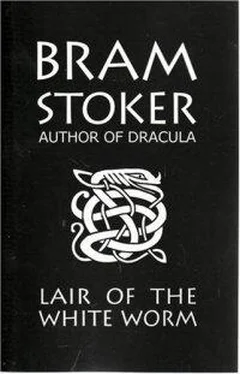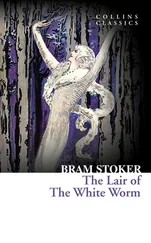Брэм Стокер - The Lair of the White Worm
Здесь есть возможность читать онлайн «Брэм Стокер - The Lair of the White Worm» весь текст электронной книги совершенно бесплатно (целиком полную версию без сокращений). В некоторых случаях можно слушать аудио, скачать через торрент в формате fb2 и присутствует краткое содержание. Жанр: Ужасы и Мистика, на английском языке. Описание произведения, (предисловие) а так же отзывы посетителей доступны на портале библиотеки ЛибКат.
- Название:The Lair of the White Worm
- Автор:
- Жанр:
- Год:неизвестен
- ISBN:нет данных
- Рейтинг книги:5 / 5. Голосов: 1
-
Избранное:Добавить в избранное
- Отзывы:
-
Ваша оценка:
- 100
- 1
- 2
- 3
- 4
- 5
The Lair of the White Worm: краткое содержание, описание и аннотация
Предлагаем к чтению аннотацию, описание, краткое содержание или предисловие (зависит от того, что написал сам автор книги «The Lair of the White Worm»). Если вы не нашли необходимую информацию о книге — напишите в комментариях, мы постараемся отыскать её.
The Lair of the White Worm — читать онлайн бесплатно полную книгу (весь текст) целиком
Ниже представлен текст книги, разбитый по страницам. Система сохранения места последней прочитанной страницы, позволяет с удобством читать онлайн бесплатно книгу «The Lair of the White Worm», без необходимости каждый раз заново искать на чём Вы остановились. Поставьте закладку, и сможете в любой момент перейти на страницу, на которой закончили чтение.
Интервал:
Закладка:
"For instance, sir?" said Adam, venturing a question.
"Well, look at those hills which surround the main one where the site for the Castle was wisely chosen—on the highest ground. Take the others. There is something ostensible in each of them, and in all probability something unseen and unproved, but to be imagined, also."
"For instance?" continued Adam.
"Let us take them seriatim . That to the east, where the trees are, lower down—that was once the location of a Roman temple, possibly founded on a pre–existing Druidical one. Its name implies the former, and the grove of ancient oaks suggests the latter."
"Please explain."
"The old name translated means Diana’s Grove. Then the next one higher than it, but just beyond it, is called Mercy —in all probability a corruption or familiarisation of the word Mercia , with a Roman pun included. We learn from early manuscripts that the place was called Vilula Misericordiae . It was originally a nunnery, founded by Queen Bertha, but done away with by King Penda, the reactionary to Paganism after St. Augustine. Then comes your uncle’s place—Lesser Hill. Though it is so close to the Castle, it is not connected with it. It is a freehold, and, so far as we know, of equal age. It has always belonged to your family."
"Then there only remains the Castle!"
"That is all; but its history contains the histories of all the others—in fact, the whole history of early England." Sir Nathaniel, seeing the expectant look on Adam’s face, went on:
"The history of the Castle has no beginning so far as we know. The furthest records or surmises or inferences simply accept it as existing. Some of these—guesses, let us call them—seem to show that there was some sort of structure there when the Romans came, therefore it must have been a place of importance in Druid times—if indeed that was the beginning. Naturally the Romans accepted it, as they did everything of the kind that was, or might be, useful. The change is shown or inferred in the name Castra. It was the highest protected ground, and so naturally became the most important of their camps. A study of the map will show you that it must have been a most important centre. It both protected the advances already made to the north, and helped to dominate the sea coast. It sheltered the western marches, beyond which lay savage Wales—and danger. It provided a means of getting to the Severn, round which lay the great Roman roads then coming into existence, and made possible the great waterway to the heart of England—through the Severn and its tributaries. It brought the east and the west together by the swiftest and easiest ways known to those times. And, finally, it provided means of descent on London and all the expanse of country watered by the Thames."
"With such a centre, already known and organised, we can easily see that each fresh wave of invasion—the Angles, the Saxons, the Danes, and the Normans—found it a desirable possession and so ensured its upholding. In the earlier centuries it was merely a vantage ground. But when the victorious Romans brought with them the heavy solid fortifications impregnable to the weapons of the time, its commanding position alone ensured its adequate building and equipment. Then it was that the fortified camp of the Caesars developed into the castle of the king. As we are as yet ignorant of the names of the first kings of Mercia, no historian has been able to guess which of them made it his ultimate defence; and I suppose we shall never know now. In process of time, as the arts of war developed, it increased in size and strength, and although recorded details are lacking, the history is written not merely in the stone of its building, but is inferred in the changes of structure. Then the sweeping changes which followed the Norman Conquest wiped out all lesser records than its own. To–day we must accept it as one of the earliest castles of the Conquest, probably not later than the time of Henry I. Roman and Norman were both wise in their retention of places of approved strength or utility. So it was that these surrounding heights, already established and to a certain extent proved, were retained. Indeed, such characteristics as already pertained to them were preserved, and to–day afford to us lessons regarding things which have themselves long since passed away."
"So much for the fortified heights; but the hollows too have their own story. But how the time passes! We must hurry home, or your uncle will wonder what has become of us."
He started with long steps towards Lesser Hill, and Adam was soon furtively running in order to keep up with him.
CHAPTER IV
THE LADY ARABELLA MARCH
"Now, there is no hurry, but so soon as you are both ready we shall start," Mr. Salton said when breakfast had begun. "I want to take you first to see a remarkable relic of Mercia, and then we’ll go to Liverpool through what is called The Great Vale of Cheshire. You may be disappointed, but take care not to prepare your mind"—this to Adam—"for anything stupendous or heroic. You would not think the place a vale at all, unless you were told so beforehand, and had confidence in the veracity of the teller. We should get to the Landing Stage in time to meet the West African , and catch Mr. Caswall as he comes ashore. We want to do him honour—and, besides, it will be more pleasant to have the introductions over before we go to his fete at the Castle."
The carriage was ready, the same as had been used the previous day, but there were different horses—magnificent animals, and keen for work. Breakfast was soon over, and they shortly took their places. The postillions had their orders, and were quickly on their way at an exhilarating pace.
Presently, in obedience to Mr. Salton’s signal, the carriage drew up opposite a great heap of stones by the wayside.
"Here, Adam," he said, "is something that you of all men should not pass by unnoticed. That heap of stones brings us at once to the dawn of the Anglian kingdom. It was begun more than a thousand years ago—in the latter part of the seventh century—in memory of a murder. Wulfere, King of Mercia, nephew of Penda, here murdered his two sons for embracing Christianity. As was the custom of the time, each passer–by added a stone to the memorial heap. Penda represented heathen reaction after St. Augustine’s mission. Sir Nathaniel can tell you as much as you want about this, and put you, if you wish, on the track of such accurate knowledge as there is."
Whilst they were looking at the heap of stones, they noticed that another carriage had drawn up beside them, and the passenger—there was only one—was regarding them curiously. The carriage was an old heavy travelling one, with arms blazoned on it gorgeously. The men took off their hats, as the occupant, a lady, addressed them.
"How do you do, Sir Nathaniel? How do you do, Mr. Salton? I hope you have not met with any accident. Look at me!"
As she spoke she pointed to where one of the heavy springs was broken across, the broken metal showing bright. Adam spoke up at once:
"Oh, that can soon be put right."
"Soon? There is no one near who can mend a break like that."
"I can."
"You!" She looked incredulously at the dapper young gentleman who spoke. "You—why, it’s a workman’s job."
"All right, I am a workman—though that is not the only sort of work I do. I am an Australian, and, as we have to move about fast, we are all trained to farriery and such mechanics as come into travel—I am quite at your service."
"I hardly know how to thank you for your kindness, of which I gladly avail myself. I don’t know what else I can do, as I wish to meet Mr. Caswall of Castra Regis, who arrives home from Africa to–day. It is a notable home–coming; all the countryside want to do him honour." She looked at the old men and quickly made up her mind as to the identity of the stranger. "You must be Mr. Adam Salton of Lesser Hill. I am Lady Arabella March of Diana’s Grove." As she spoke she turned slightly to Mr. Salton, who took the hint and made a formal introduction.
Читать дальшеИнтервал:
Закладка:
Похожие книги на «The Lair of the White Worm»
Представляем Вашему вниманию похожие книги на «The Lair of the White Worm» списком для выбора. Мы отобрали схожую по названию и смыслу литературу в надежде предоставить читателям больше вариантов отыскать новые, интересные, ещё непрочитанные произведения.
Обсуждение, отзывы о книге «The Lair of the White Worm» и просто собственные мнения читателей. Оставьте ваши комментарии, напишите, что Вы думаете о произведении, его смысле или главных героях. Укажите что конкретно понравилось, а что нет, и почему Вы так считаете.












